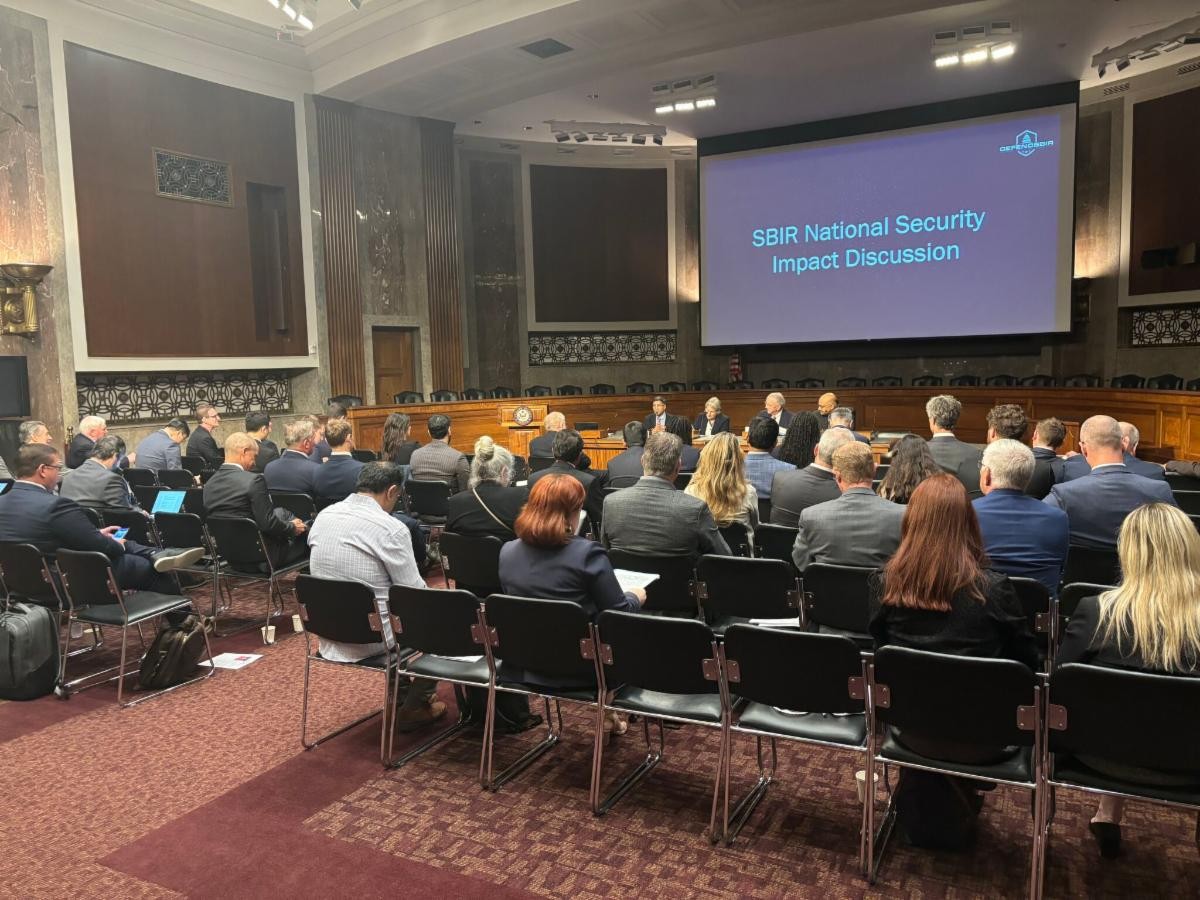Welcome to the September edition of A Capitol View!
SMI has been busy this month organizing fly-ins for leading innovators in energy and defense tech, and spearheading other national gatherings to engage Congress, the executive branch, and industry in such vital sectors as advanced materials and domestic manufacturing.
Defending SBIR: We are heavily engaged in an advocacy campaign to ensure that the Small Business Innovation Research (SBIR) and Small Business Technology Transfer (STTR) programs continue to meet the federal government’s unique technology needs.
That means educating lawmakers and staff on why the four-decade-old seed fund is an especially crucial pipeline for defense innovation and must be reauthorized before the end of the month.
New momentum: A big bipartisan boost came with House passage on September 15 of a clean, one-year extension.
“The SBIR and STTR programs are essential to keeping our economy competitive and extending them ensures entrepreneurs can continue developing the ideas that shape tomorrow,” said House Small Business Committee Chair Rep. Roger Williams (R-TX). “This extension provides needed stability, but our work is not finished. We must deliver a long-term solution that strengthens and reforms the programs while giving innovators the certainty they deserve.”
Ticking clock: All eyes are now on the Senate, where SMI has been organizing meetings between small businesses and lawmakers. We also convened a forum on September 10 to highlight SBIR and STTR success stories, unveil new research on transition rates, and hear from a range of voices in and out of government.
“Every dollar of DOD SBIR activity generates $4 in follow-on non-SBIR research, development, test, and evaluation funding,” Dr. Maryann Feldman, who is co-chairing a National Academies study on SBIR and defense, told the forum.
She added that a push to cap SBIR awards to individual companies “ignores the fact that firms have multiple Principal Investigators” and “SBIR firms are an effective platform for organizing innovative activity.”
“Don’t cap submissions,” she recommended, noting the objective of the programs “is to source the best ideas.”
‘Solve, Build, Imagine, Repeat’: Paramount is ensuring that final legislation retains the merit-based principles of the competitive awards.
“It works because of the merit-based competition that is at the very heart of the program,” Sen. Edward Markey, ranking member of the Senate Small Business Committee, said at the forum. “Darwinian, paranoia-inducing competition for these programs is what it’s all about. And that’s what drives innovation.”
“SBIR could also stand for solve, build, imagine, repeat,” he added. “SBIR, over and over again, driving this innovation system in our country.”
Learn more: Defend Small Business Innovation Research
Watch the Capitol Hill SBIR Forum: YouTube
SMI SPOTLIGHT
NEW ORBIT: SMI is thrilled to welcome Mark Bitterman as a new Senior Advisor. Mark is a tested government affairs and business development leader with three decades of experience shaping aerospace and defense industry policy and strategy.
Mark is currently VP of Government Affairs at Portal Space Systems, a startup in Washington State pioneering in-space mobility and satellite maneuverability technology, where he is managing relationships with government agencies to enable greater freedom and flexibility in space operations.
He was previously a top executive at Stratolaunch Orbital Sciences Corporation. His government career included serving as Special Assistant for Intelligence and Special Operations in the Office of the Secretary of Defense. Mark is also a board member of the National Defense Industrial Association.
Check out all of our senior advisors.
HONOR ROLL: Congrats to SMI VP Dr. Aisha Haynes, who will be inducted as a fellow of Alpha Sigma Mu, the international professional honor society, at the International Materials, Applications, and Technologies Meeting in Detroit next month. She will be recognized for her accomplishments and contributions to the materials science and engineering profession.
Dr. Haynes will also participate on a panel on “Revolutionary Changes in Materials Manufacturing.”
 THOUGHT LEADERSHIP: SMI VP David Bortnick explains in a new commentary in RealClearDefense the security implications of Trump administration plans to reportedly terminate the Baltic Security Initiative, which was enacted by Congress in 2020 to help train and equip Estonia, Latvia, and Lithuania in areas such as integrated missile defense and maritime domain awareness.
THOUGHT LEADERSHIP: SMI VP David Bortnick explains in a new commentary in RealClearDefense the security implications of Trump administration plans to reportedly terminate the Baltic Security Initiative, which was enacted by Congress in 2020 to help train and equip Estonia, Latvia, and Lithuania in areas such as integrated missile defense and maritime domain awareness.
A new opportunity: Bortnick asserts that the renewed focus on the initiative, which is once again funded to the tune of $225 million in the Senate’s version of the Fiscal 2026 Defense Appropriations Act, offers “an opportunity to evaluate its progress and priorities, particularly in light of recent tactical and technological changes on the battlefield in Ukraine with drone warfare.”
“Initiatives are meant to drive urgency and should be reevaluated, refined, and their objectives sunset if they have been met,” added Bortnick, a former House Appropriations staffer and Office of Management and Budget analyst. “Abruptly cutting off funding would risk sacrificing the gains that have been made and would send the wrong signal to our allies and adversaries. A structured review can update priorities and keep the focus on results that strengthen U.S. national security. Congress can direct such a review, or the Administration can lead the way.”
CONGRESS
 BUDGET BATTLES: A fresh Republican proposal is in the offing for a temporary continuing resolution to keep the government running after September 30.
BUDGET BATTLES: A fresh Republican proposal is in the offing for a temporary continuing resolution to keep the government running after September 30.
The CR, which would keep the government open until November 21, would mean no new programs could be initiated come October. But it calls for additional funding for congressional security and extends some key programs like the Defense Production Act extension, the Virginia class submarine program and E-7 Wedgetail surveillance aircraft, and some health programs.
Health check: Democrats are signaling they won’t play ball, raising the chances of a standoff that could shutter federal agencies, at least temporarily.
“The House Republican-only spending bill fails to meet the needs of the American people and does nothing to stop the looming healthcare crisis,” House Minority Leader Hakeem Jeffries and Senate Minority Leader Chuck Schumer said in a joint statement.
We expect a Democratic counter proposal that also extends insurance subsidies under the Affordable Care Act.
Read more: Committee Releases Bill to Keep Government Open, Support Return to Regular Order
ON THE HORIZON: It also means the annual appropriations process for federal agencies will remain in flux as we head into the final months of the calendar year.
Defense spending: We still anticipate passage of the annual defense funding bill before the end of 2025, as well as the National Defense Authorization Act, which sets policy.
The Senate and House still must reconcile their versions of the Defense Appropriations Act, which were passed by each chamber in July. Here is a good breakdown of the differences.
NDAA update: Meanwhile, the House passed its version of the NDAA, mostly along party lines, on September 10. This includes the bipartisan Speed Act, which would give the Department of War new authorities and remove bureaucratic hurdles to deliver new capabilities in months rather than years. The Senate version of the bill remains in doubt.
Read more: Senate may skip the NDAA again
DEFENSE
 ARSENAL OF DEMOCRACY: Our expanding work with the nonprofit Society of Manufacturing Engineers (SME) is laser-focused on helping advance new initiatives that ensure we have the manufacturing technology and workforce needed to rebuild our military.
ARSENAL OF DEMOCRACY: Our expanding work with the nonprofit Society of Manufacturing Engineers (SME) is laser-focused on helping advance new initiatives that ensure we have the manufacturing technology and workforce needed to rebuild our military.
In a partnership with the U.S. Navy Talent Pipeline Program, SME is seeking small- and medium-sized manufacturers across the Great Lakes region for the SME Talent Pipeline Summit.
The one-day event, to be held October 22, is focused on helping companies “tap into the resources, partnerships, and workforce talent needed to strengthen our nation’s maritime defense industrial base.”
Learn more: SME Talent Pipeline Summit
‘MASSIVELY MORE EFFECTIVE’: SMI is also a proud partner of Govini, the defense software company that is rewiring how the Pentagon manages its complex supply chains and uses data to vastly improve and accelerate acquisition outcomes.
Jeffrey “Jeb” Nadaner, Senior VP for Government Affairs, recently addressed the National Conservatism Conference on the historic opportunity to reignite America’s industrial base after too many years of neglect.
Reversing course: “President Trump is pushing gamely against the trends of recent history to make America an industrial superpower again,” said Nadaner, who served as a top defense industrial base official in the first Trump term. “Through strategic use of tariffs, tax credits, grants, and loans to strategic sectors with direct military implications.”
He also stressed the key role of software in this transformation. “Paradoxically, it is software that may be the key to America’s hardware manufacturing renaissance. We’ve found that artificial intelligence can make industrial production processes massively more effective, efficient, and affordable.”
More Govini insights: From Factory to Fight: A Modern Framework for Defense Logistics
Plus: Next Steps for DoD to End U.S. Reliance on China for Rare Earth Elements
ENERGY
 ‘WORLD CLASS ASSET’: In a major milestone, SMI client Smackover Lithium, a joint venture between Standard Lithium and Equinor, completed a feasibility study for its Southwest Arkansas Project that moves it closer to the first commercial direct lithium extraction in the United States.
‘WORLD CLASS ASSET’: In a major milestone, SMI client Smackover Lithium, a joint venture between Standard Lithium and Equinor, completed a feasibility study for its Southwest Arkansas Project that moves it closer to the first commercial direct lithium extraction in the United States.
The study confirms “what we’ve known for a long time – that this is a world class asset and opportunity,” said Andy Robinson, president of Standard Lithium. “Through years of extensive testing and development, we have substantially de-risked the process technology and increased our confidence in project execution.”
He added that the company is “excited by the prospect of being a domestic champion for securing critical minerals production in the United States.”
The Smackover Formation is a geological formation rich in deposits of oil and lithium that extends across parts of Arkansas, Louisiana, Texas, Alabama, Mississippi, and Florida.
What’s next: The company says initial annual production capacity of 22,500 tonnes of battery-quality lithium carbonate is targeted for 2028.
Read more: Smackover Lithium Announces Positive Definitive Feasibility
‘GAMECHANGER’: In another breakthrough, SMI client Factorial Energy achieved a major milestone this month when Mercedes-Benz AG used its next generation lithium-metal solid-state battery technology for a 1,205-kilometer, or nearly 750-mile, road trip from Germany to Sweden without a single charging stop.
“The solid-state battery is a true gamechanger for electric mobility,” said Markus Schäfer, Mercedes’ chief technology officer for development and procurement.
“…We show that this technology delivers not only in the lab but also on the road.”
“Our goal,” he added, “is to bring innovations like this into series production by the end of the decade and offer our customers a new level of range and comfort.”
Read all about it: Long-distance test successfully completed: EQS with solid-state battery covers 1,205 km on a single charge
WATER WORKS: SMI’s water power technologies team, spearheaded by Damian Kunko, Jeffrey Leahey, and Paul Gay, continues to lead the industry in building public-private partnerships to unleash one of the nation’s largest untapped energy sources.
Paul recently delivered a federal policy and investment update at the Ocean Renewable Energy Conference, co-hosted by UMERC-US at SMI client Oregon State University.
He also participated in a meeting in Portland with Rep. Suzanne Bonamici, co-chair of the bipartisan Oceans Caucus, to discuss reauthorization of DOE’s Water Power Technologies Program.
CLIENTS IN THE NEWS
Fincantieri begins construction of world’s first hydrogen-powered cruise ship
CET Expands AUV Family With HADALUS-XL
Why Warren Buffett Bet Nearly $1 Billion on Steel — And Why You Should, Too
These 11 Mass. colleges are in the top 100 in the country, Forbes says






